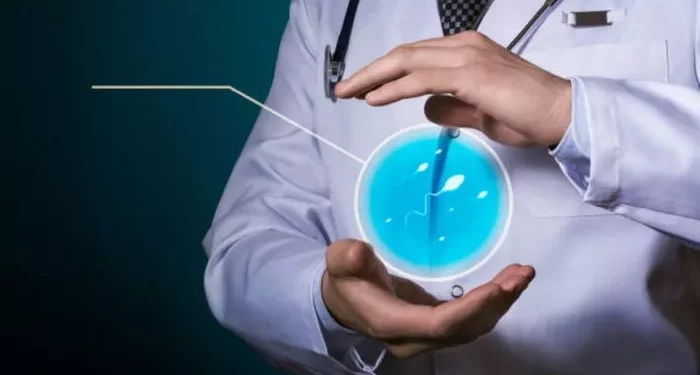Azoospermia, a term stemming from the Greek words “a” (without) and “sperma” (seed), refers to the absence of measurable sperm in the semen. This condition poses a significant challenge for individuals or couples aspiring to conceive. Typically, sperm is produced in the testicles and then travels through the reproductive system, where it mixes with fluids to form semen, ready for fertilization. However, disruptions at various stages of this journey can lead to azoospermia.
Types of Azoospermia:
There are three primary classifications of azoospermia, each stemming from different underlying causes:
1. Post-Testicular Azoospermia: This type is characterized by blockages or missing connections along the reproductive tract, hindering the sperm‘s journey from the testicles to the ejaculatory duct. Common causes include previous surgeries, infections, or congenital conditions affecting the vas deferens or ejaculatory ducts.
2. Testicular Azoospermia: Here, the issue lies within the testicles themselves, where poor or no sperm production occurs due to structural or functional abnormalities. Factors such as genetic disorders, chemotherapy, radiation therapy, or undescended testicles during childhood can contribute to this form of azoospermia.
3. Pretesticular Azoospermia: In this type, the testicles are structurally intact, but hormonal imbalances prevent adequate stimulation for sperm production. Causes may include pituitary gland disorders, thyroid dysfunction, or certain medications disrupting hormone levels crucial for spermatogenesis.
Causes:
Understanding the root causes of azoospermia is crucial for determining appropriate treatment strategies. Broadly, these causes can be categorized as obstructive or nonobstructive:
Obstructive Causes: Blockages or severed connections impede the passage of sperm. These obstructions can result from infections, previous surgeries like vasectomy, or congenital abnormalities in the reproductive tract.
Nonobstructive Causes: This category encompasses a spectrum of disorders, damage, or hormonal imbalances affecting testicular function. Conditions such as varicocele (enlarged veins within the scrotum), genetic disorders like Klinefelter syndrome, or autoimmune diseases can impair sperm production independent of blockages.
Treatment Options:
Fortunately, advancements in medical science offer several avenues for managing azoospermia:
1. Medication: Hormonal imbalances contributing to azoospermia can often be corrected with medication. For example, drugs like clomiphene citrate or human chorionic gonadotropin (hCG) can stimulate testosterone production and enhance sperm production. Additionally, medications may be prescribed to address conditions like retrograde ejaculation, where semen is redirected to the bladder instead of being ejaculated.
2. Surgical Repair: In cases of obstructive azoospermia, surgical interventions such as vasectomy reversal or epididymal repair can restore the flow of sperm. Microsurgical techniques have significantly improved success rates in repairing blockages and reconnecting the reproductive tract.
3. Sperm Extraction: When natural conception is unattainable, assisted reproductive techniques offer hope. Sperm can be directly retrieved from the epididymis or testicles through procedures like percutaneous epididymal sperm aspiration (PESA) or testicular sperm extraction (TESE). These extracted sperm can then be used in conjunction with in vitro fertilization (IVF) or intracytoplasmic sperm injection (ICSI) to achieve pregnancy.
4. Hormone Therapy: In cases of pretesticular azoospermia, where hormonal imbalances impede sperm production, hormone replacement therapy may stimulate spermatogenesis. Close monitoring by a reproductive endocrinologist is essential to adjust hormone levels and optimize fertility potential.
5. Testicular Sperm Extraction (TESE): When sperm production within the testicles is compromised, TESE offers a direct approach to retrieve viable sperm for assisted reproduction. This procedure involves extracting tissue samples from the testicles, which are then examined for the presence of sperm under a microscope.
Prognosis and Fertility:
While a diagnosis of azoospermia can initially evoke feelings of despair, it’s essential to recognize that many underlying causes are treatable, offering hope for restored fertility. With advancements in reproductive medicine and personalized treatment approaches, individuals with azoospermia have a reasonable chance of achieving biological parenthood. However, the success of treatment depends on various factors, including the specific cause of azoospermia, the individual’s overall health, and their partner’s fertility status.
Living With Azoospermia:
Coping with azoospermia involves addressing not only the physical aspects but also the emotional and psychological impacts of infertility. It’s crucial for individuals and couples facing this challenge to seek support from healthcare professionals, support groups, or mental health counselors specializing in fertility issues. Open communication with partners, family members, and friends can also alleviate feelings of isolation and facilitate mutual support.
Encourage Seeking Professional Help:
Ultimately, navigating the complexities of azoospermia and infertility requires a collaborative approach between patients and healthcare providers. Encourage individuals to proactively seek medical guidance, undergo thorough diagnostic evaluations, and discuss available treatment options tailored to their unique circumstances. By empowering individuals with knowledge and support, we can unlock the potential for hope and fulfillment on their journey towards parenthood.
Conclusion
In conclusion, while azoospermia presents significant challenges to fertility, it is not necessarily a roadblock to parenthood. With advancements in medical technology and comprehensive treatment approaches, many individuals can overcome this condition and realize their dreams of starting a family. By understanding the causes, exploring treatment options, and seeking support, individuals and couples affected by azoospermia can embark on a path towards hopeful possibilities and fulfilling futures.
Related Topics:
Chromosome Testing for Male Infertility: Meeting User Needs



























